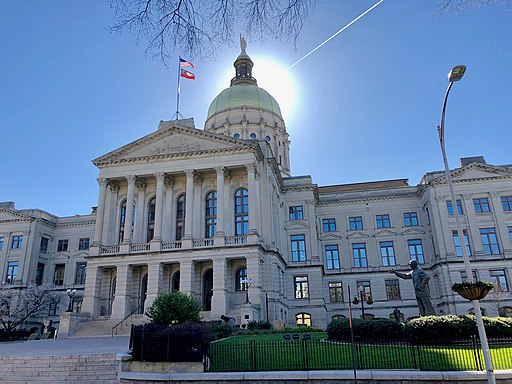Georgia is holding a special election for two of five seats on the Georgia Public Service Commission on November 4, 2025. The primary was held on June 17, 2025, and a primary runoff was held on July 15, 2025. A general runoff (if necessary) will be held on December 2, 2025.
The Georgia Public Service Commission regulates the state's utility services, such as electricity, phones, and gas. While the position is elected statewide, candidates must live in the district they are running in.
The Atlanta Journal-Constitution's Mark Niesse wrote that this was the first election "following three years of canceled races and a court battle over the legality of statewide voting that has elected only one Black candidate to the board." To read more about the lawsuits that caused the cancellation, click here.
Incumbent Tim Echols (R) and Alicia Johnson (D) are running in District 2, which covers the eastern part of the state and includes the cities of Athens and Savannah. Echols was first elected in 2010. In his response to Ballotpedia's Candidate Connection survey, Echols wrote he wanted to pause rate increases, focus on clean energy, and build nuclear reactors to replace coal plants. Johnson is a nurse. In her response to Ballotpedia's Candidate Connection survey, Johnson said she wanted to increase transparency, invest in clean energy, and support fairer energy rates.
Incumbent Fitz Johnson (R) and Peter Hubbard (D) are running in District 3, which covers much of the Atlanta metropolitan area, including Fulton County and DeKalb County. Governor Brian Kemp (R) appointed Johnson to the commission in 2021. In a statement, Johnson said he was "committed to keeping energy reliable, affordable, and grounded in conservative principles.” Hubbard has worked in renewable energy development. In his responses to Ballotpedia's Candidate Connection survey, Hubbard wrote he was campaigning to lower energy costs, improve transparency, and prevent rate increases.
Politico's Andrew Howard wrote, "Even though national money won’t be pouring into these races, both parties see how Georgians will vote this November as a chance to set the tone ahead of the midterms." Bolts Magazine's Camille Squires wrote that turnout from other down-ballot elections could help Democrats: "turnout may be helped by the fact that there will be municipal elections on the ballot in some places, including the mayoral race in Atlanta... [the Democratic candidates] will need very heavy support in the Atlanta region." University of Georgia Prof. Charles Bullock says that Republicans will have the advantage of incumbency and partisan dynamics: "Georgia is still more Republican than Democratic... It also helps that once we get to the general election ballot, it’ll have the ‘I’ beside their name, indicating they are the incumbents."
Tim Echols (R), Alicia Johnson (D), and Peter Hubbard (D) have completed Ballotpedia's Candidate Connection survey. Click here to read their responses.



